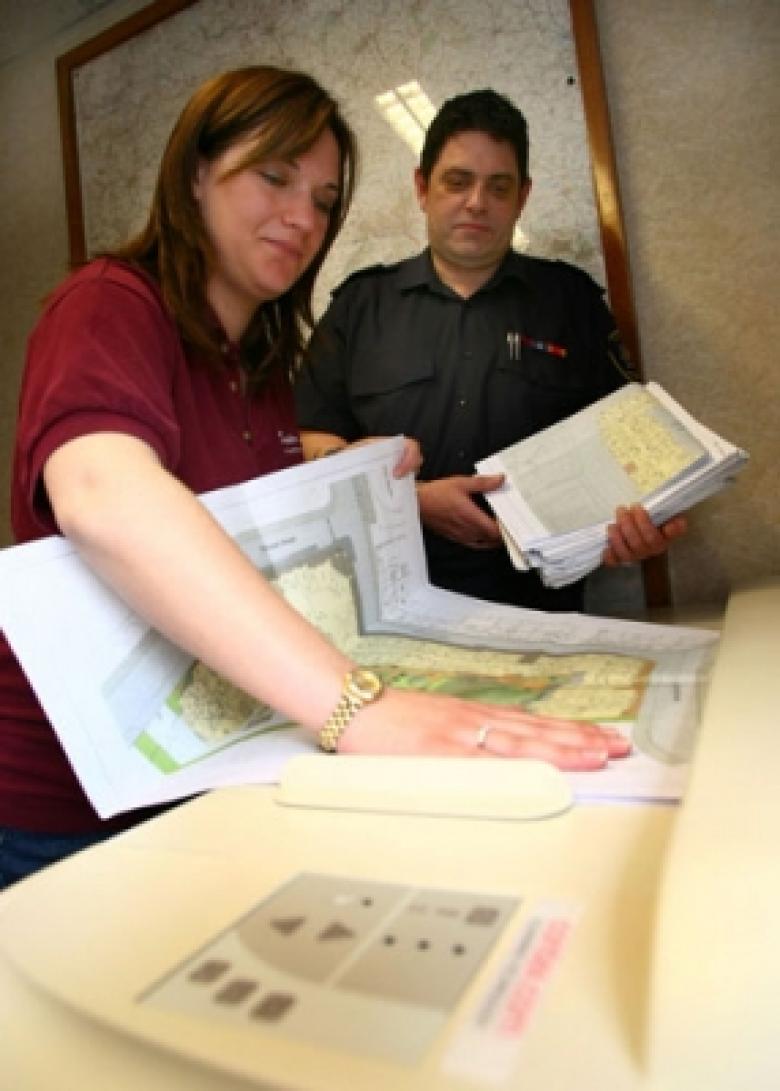
Shropshire Fire and Rescue Service's Fire Prevention department is one of the first in the UK to go fully digital with tons of "critically important" fire safety paperwork – some dating back to the Second World War.
A total of 1½ million documents containing vital fire safety information were stored in an archive that was "bursting at the seams."
Since the introduction of the Government's Regulatory Reform (Fire Safety) Order in 2005, SFRS has seen a threefold increase in the properties they now inspect.
Around 17,000 property files detailing Shropshire business premises and public buildings are now being successfully converted into computer files in a major digitalisation exercise due to be completed at the Shrewsbury fire HQ in June 2008.

Detailed information is transferred to a Smartboard operated by Anthony Derricutt.
The £52,500 operation, which will lead to future financial savings in administration and storage expenses, will significantly improve the working efficiency of the brigade's fire safety department, said Mike Ablitt, Head of Fire Prevention.
"We believe we have one of the most modern and progressive fire safety departments in the UK and we are constantly seeking innovative ways of streamlining our work so that we focus on providing an excellent service and one that reflects best value for money."
Building plans have been scanned and are now viewed on large plasma screen office monitors and on tablet and desktop PC's. By using a "smart screen" overlay and specialist software, fire officers can work on the plans electronically dispensing with the old fashioned "pen and ink" leading to an environmentally friendly office with large savings on paper.

Thousands of files have been inputted onto computer – picture with community fire safety officer Delyth Humphreys
"It also means we can respond to planning applications much quicker and we hope to dispense with paper plans totally in the future."
Inspection teams have been equipped with tablets PC's so that they can collect inspection information onto computer and download it onto the main database either at their office or remotely via one of Shropshire's many satellite retained fire stations.
"The electronic files are stored on our fire safety database so that the Inspecting Officer has every piece of information about a property at their fingertips, either at their desks, or out in the field," said Mike.
"This has made our Inspection Team far more mobile and will greatly enhance our productivity. An added bonus is that the Tablet PC's act as mobile technical libraries so our officers have all the information they could ever wish for right with them when they are working away from headquarters.

Watch Manager Wes Shutt can input information directly onto his tablet computer after an office or factory visit. The information is also available to incident command in an emergency.
The digitalisation exercise solves a huge problem for fire officers who had literally run out of storage space for their fire safety files.
"As well as saving archive rental fees, the digitised files overcome a big vulnerability in that it was never practicable to back up the paper files. Digitised files contribute to securing our business continuity arrangements," he added.
"Innogistic, a Bristol based computer company, which developed the CFRMIS database have written a special program for the Brigade so that the scanned files can be automatically attached to the appropriate premises file on the database. The digitisation process has been undertaken by Micro Imaging Services Ltd of Hertfordshire.
Digitising fire safety files and premises plans also provides enhanced "fire ground intelligence," said Mike.
"Fire Officers have instant computer access to documents and plans detailing fire safety arrangements in commercial properties which can be a lifesaver in an emergency.
"The digital data is now available day or night for our operational colleagues while attending fires and for other emergency services which sometimes require information about properties during a 999 incident," he said.
Copies of relevant fire safety data such as property plans can be sent "24/7" via mobile data terminals from fire control to front line operations.
"It means that we don't have to search out and grapple with large planning documents to gain information about a property. The incident commander will have the information on site and at the press of a button."
Shropshire Fire and Rescue Service is available to advise other UK brigades on the digital process and the use of the specially written computer program.




